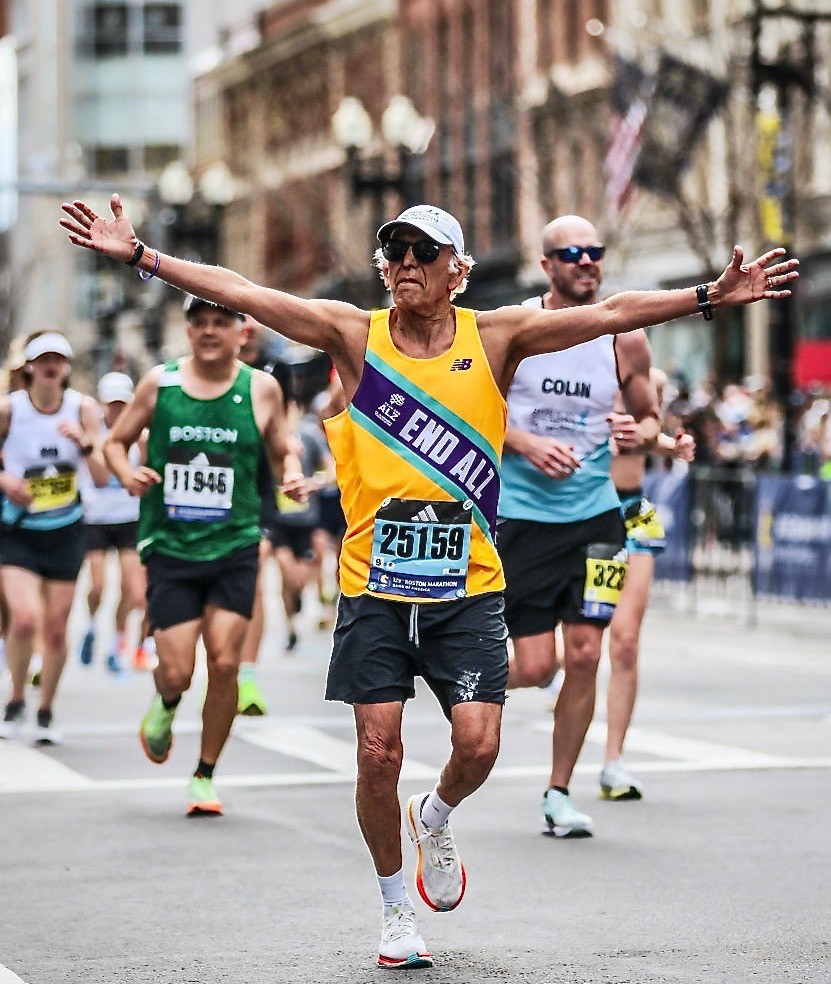Ralph Carmona celebrates as he approaches the finish line during his first ever Boston Marathon on Monday. Courtesy Ralph Carmona
Neither an injured foot nor several visits to medical tents kept Ralph Carmona from completing his first Boston Marathon on Monday.
Carmona, who ran to raise awareness for Alzheimer’s disease and the importance of federal research funds, finished the 26.2-mile race in 4 hours, 14 minutes, 42 seconds.
While that was about 10 minutes slower than his qualifying time of 4 hours, 4 minutes, it was fast enough to qualify for next year’s 75-79 age group. The 74-year-old — one of about 210 Mainers who qualified for this year’s race — said he fully intends to run again.
“I wouldn’t miss it. I mean, there’s nothing like it,” Carmona said on a phone call Thursday morning. “I’ve never seen crowds like this.”
Carmona was diagnosed with Alzheimer’s about a decade ago. The disease affects 7 million people in the U.S., including about 29,000 in Maine. Shortly after his diagnosis, Carmona enrolled in a clinical trial for Lequembi, a drug that would later become the first medication approved by the FDA proven to slow the disease’s progression.
The trial was overseen by the National Institutes of Health — one of many agencies whose funding has been threatened or cut by the Trump administration.
“My personal problem is also a public problem for the country. You cannot disconnect the two,” Carmona told the Press Herald this month.
Carmona ran to spread awareness of the importance of research funding and to raise money for the Alzheimer’s Association. So far, Carmona has raised $4,750, though he hopes to bring in more. As he traced the roads from Hopkinton, Massachusetts, to Boston, he wore a bright yellow jersey emblazoned with six letters: “END ALZ.”
He likened completing the marathon to a spiritual experience and said the mass of runners — not to mention thousands of cheering bystanders — helped fuel his energy.
“I’m energized by people. I embrace them, and they elevate me,” he said.
That support kept him moving even as his body began to stiffen up about halfway through the race.
Just a few weeks before the marathon, Carmona developed tendinitis in his right foot from running up and down Munjoy Hill to prepare for Boston’s hilly terrain. Though the pain flared up during the first few miles, it was manageable at first, he said.
But around 11 miles in, Carmona suffered a cramp in his right calf, prompting him to stop at a nearby medical tent, where volunteers applied pain relief cream and sent him back onto the course.
“The rest of my body was compensating for the foot,” he said. “I went to five different medical tents.”
When he crossed the finish line in Boston’s Copley Square, Carmona said he was greeted by a handful of volunteers from Maine, who recognized him from coverage in the media. They helped him call his wife, who whisked him back to the hotel room “all in one piece,” he said.
The race left him exhausted and limping, but for just over four hours, Carmona was on top of the world.
“When you get to the tail end, it narrows. And people’s hands are out, (they’re) screaming, going crazy,” Carmona said. “I would lift my hand up and the volume would just elevate like three or four times.”



